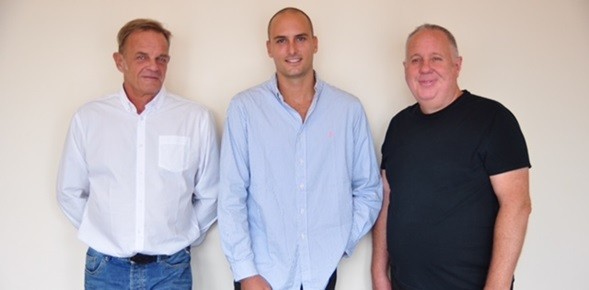Rebel beach club Le Pirate targets the opening of 20 properties by 2020 within and beyond Indonesia.
JAKARTA, INDONESIA – Indonesia’s rebel beach club brand Le Piratehas announced plans to expand its footprint within the country and throughout Asia.
In the span of three short years the father son team of Fredo and Louka Taffin has created a blueprint for fast-paced growth with their social beach club and hotel concept.
Long-time Bali design guru Fredo Taffin, the architect that helped create legendary beach club KU DE TA, came up with idea for Le Pirate after facing the challenge of building resort hotels in remote tropical locations. His concept was to distill appealing accommodation options into eco-friendly, pre-fab bungalows that are fast and cost efficient to build, but do not destroy the islands’ beaches.
Taffin teamed up with his millennial son Louka, who has already become a successful hospitality entrepreneur at the age 27. Both of them hated the way resorts were all about welcome drinks, grim soulless buffets, and designed to put guests in a virtual lock-down, keeping them away from each other.
Louka explains, “Traditional hoteliers are obsessed by guest rooms and forget that hospitality from its earliest roots in pub hotels, is all about meeting people, going local, and not just about the four walls you sleep in. At Le Pirate we don’t want heads on beds, we want bums at the beach club, travellers who have a pulse and aren’t afraid to use it.”
Today, the brand’s pathway to expansion is clearly displayed through its main points of difference – being able to pre-fabricate beach club hotels and assemble them on-site complete with fit-out in under six months from start to finish. Investors often have to wait a decade to generate a good return, with a typical Le Pirate project; it is two to three years. Fredo adds, “We are breaking down the walls of hotel ownership that used to be measured in dog years but have now been be accelerated into real time.”
One sure sign that Millennial and Gen Z travelers are looking beyond hotels for new experiences is the global boom in poshtels. Essentially these new concept accommodation options offer a more polished take on hostels, punctuated by the broader trend of friending and travelling together.
Le Pirate’s first beach club hotel in Nusa Ceningan off the coast of Bali gathered a strong reputation very quickly with the social media and smartphone set. Images, YouTube videos and chats on Facebook, Twitter and beyond have been a strong driver of direct bookings. Further momentum came with the opening of a larger property in Gili Trawangan and most recently in the buzzing destination of Labuan Bajo in Flores.
As for the shift into floating beach club cruisers, tagged as Explorer, Louka says, “We wanted to take one of Indonesia’s key attributes – the spectacular ocean and numerous islands – and make them more accessible in a fun, authentic and natural way. No pretentions here, its bums on boats, and the more the merrier.”
Looking to expansion, Fredo and Louka have teamed up with hospitality expert Bill Barnett, Founder of Asia-based tourism and consulting group C9 Hotelworks, to grow the model into one that is now pushing outside Indonesia.
According to C9 Hotelworks most recent Southeast Asia Hotel Market Trends Report, Indonesia’s inventory of poshtels has skyrocketed in last year with a 73% year-on-year rise. Bill Barnett said, “We are seeing poshtels across the archipelago shift outside of areas like Bali into more emerging locations like the Gilis, Flores, Rajah Ampat, and even cultural destinations like Malang. Our data shows just under 200 poshtel-type properties already operating in the country.”
With Le Pirate International established in Singapore, the team is working on pushing out licensing and branding model and engaging developers who want to enter the hotel business, but don’t know where or how to start. The “hotel in a box” concept covers design, training, fit-out, as well as management systems that don’t take a rocket scientist to run. Currently the development pipeline is focused on the Philippines, with its impressive 7,107 islands, and also in burgeoning destinations like Sri Lanka and Myanmar.
Fredo comments, “Wherever beach bums are headed, we will be there with our beach clubs, boats and an ability to innovate in emerging locations such as remote islands. Travellers at any age still have those childhood dreams of being a pirate, and our clubs and cruises are meant to bring back the thrills, chills and sense of adventure that comes when you get outside those four same hotel walls. We aren’t just hitting the millennial market, we are keen to build a brand that will also fit Gen-Z.”
Photo caption (left to right): Fredo Taffin and Louka Taffin, founders of Le Pirate beach club brand with Bill Barnett, Managing Director, C9 Hotelworks
Theodore is the Co-Founder and Managing Editor of TravelDailyNews Media Network; his responsibilities include business development and planning for TravelDailyNews long-term opportunities.




![[PR] PR_Ascott and Vimut Hospital_2024](https://www.traveldailynews.asia/wp-content/uploads/2024/04/PR-PR_Ascott-and-Vimut-Hospital_2024-400x265.jpg)





























































